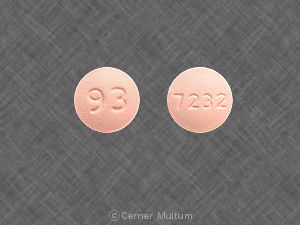Ribavirin (inhalation)
Generic name: ribavirin (inhalation) [ RYE-ba-VYE-rin ]
Brand name: Virazole
Dosage form: inhalation powder for reconstitution (6 g)
Drug classes: Inhaled anti-infectives, Purine nucleosides
What is ribavirin inhalation?
Ribavirin inhalation is an antiviral medicine that is used to treat babies and young children with severe lung infections caused by respiratory syncytial virus (RSV).
Ribavirin inhalation may also be used for purposes not listed in this medication guide.
Ribavirin inhalation side effects
Get emergency medical help if your baby has signs of an allergic reaction: hives; difficult breathing; swelling of the face, lips, tongue, or throat.
Your baby will remain under constant supervision during treatment with ribavirin inhalation. Any problems the baby has during this time may require further treatment by healthcare professionals.
Sudden breathing problems may occur. Tell your baby's caregivers at once if the baby has any of these side effects:
-
shallow breathing;
-
limpness or severe weakness;
-
wheezing, gasping for breath;
-
blue-colored lips, cold and clammy skin;
-
cough with mucus; or
-
other worsened breathing problems.
Although it may be unlikely, it is possible that ribavirin inhalation could be released into the air in amounts high enough to cause side effects in people who have close contact with the child receiving ribavirin. Tell your doctor if you have any of these side effects while caring for the child:
-
chest pain, shortness of breath;
-
runny nose, sore throat;
-
headache, dizziness;
-
rash; or
-
eye redness, watery eyes.
Some symptoms of exposure to airborne ribavirin in an adult may be similar to the symptoms of infection with RSV. Report any new symptoms to the doctor right away.
This is not a complete list of side effects and others may occur. Call your doctor for medical advice about side effects. You may report side effects to FDA at 1-800-FDA-1088.
Related/similar drugs
Epclusa, Harvoni, Arexvy, Mavyret, sofosbuvir / velpatasvir, Abrysvo, ribavirin
Warnings
Your child may have sudden breathing problems while being treated with this medicine. Your child's lung function will be tested often.
Before taking this medicine
Your child should not be treated with ribavirin if the child is allergic to ribavirin (such as Rebetol, RibaPak, Ribasphere, RibaTab).
This medicine is for use only in young children, but ribavirin can harm an unborn baby or cause birth defects.
Ribavirin inhalation should not be used by a woman who is pregnant or may become pregnant, or a man whose sex partner is pregnant.
How is ribavirin inhalation given?
A healthcare provider will give your baby this medicine in a hospital.
Ribavirin inhalation is given with a machine that releases the medicine as an aerosol into an oxygen hood or tent, or a face mask. This allows your child to gently inhale the medicine over a long period of time.
Ribavirin inhalation is usually given for 12 to 18 hours per day for 3 to 7 days.
Small amounts of ribavirin may be released into the nearby air while this medicine is being given to your child. Anyone in close contact with the child may be exposed to ribavirin released into the air.
Your child's lung function will be tested often. The doctor may prescribe bronchodilator medication to help improve your child's breathing.
You may need to follow special precautions to avoid exposure to airborne ribavirin while your baby is being treated with this medicine. Carefully follow all directions about handling or being near your child.
Women who are able to become pregnant should avoid close contact with the child. Otherwise, take all safety precautions needed to reduce your exposure to ribavirin.
Being near a child who has RSV may increase your risk of becoming infected with the virus. Seek medical attention if you have symptoms such as headache, stuffy nose, sore throat, cough, fever, hoarseness, and wheezing.
Ribavirin inhalation is for use only in babies and young children and should not be used by an adult.
What happens if I miss a dose?
Because your child will receive ribavirin inhalation in a clinical setting, a missed dose is not likely.
What happens if I overdose?
Since ribavirin is given by a healthcare professional in a medical setting, an overdose is unlikely to occur.
What should I avoid while receiving ribavirin inhalation?
Follow your doctor's instructions about any restrictions you should follow while caring for a child being treated with this medicine.
What other drugs will affect ribavirin inhalation?
Your child's caregivers will manage and monitor all medications given to the child during treatment with ribavirin.
Do not give any medications to your child that have not been prescribed by your doctor. This includes vitamins, minerals, or herbal products.
More about ribavirin
- Check interactions
- Compare alternatives
- Pricing & coupons
- Reviews (10)
- Drug images
- Side effects
- Dosage information
- During pregnancy
- Drug class: inhaled anti-infectives
- Breastfeeding
Patient resources
- Ribavirin drug information
- Ribavirin (Inhalation) (Advanced Reading)
- Ribavirin (Oral) (Advanced Reading)
- Ribavirin Capsules
- Ribavirin Tablets
- Ribavirin Inhalation Solution
Other brands
Rebetol, Copegus, RibaPak, Virazole, ... +3 more
Professional resources
Other brands
Rebetol, Copegus, Virazole, Moderiba
Related treatment guides
Further information
- Your doctor can provide more information about ribavirin.
Remember, keep this and all other medicines out of the reach of children, never share your medicines with others, and use this medication only for the indication prescribed.
Always consult your healthcare provider to ensure the information displayed on this page applies to your personal circumstances.
Copyright 1996-2024 Cerner Multum, Inc. Version: 1.01.

